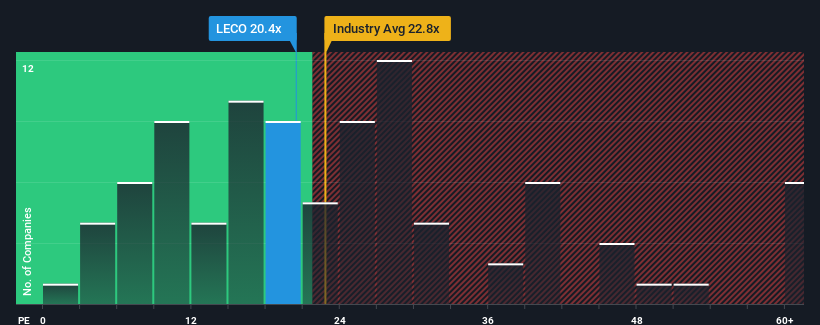- United States
- /
- Machinery
- /
- NasdaqGS:LECO
Getting In Cheap On Lincoln Electric Holdings, Inc. (NASDAQ:LECO) Is Unlikely

Lincoln Electric Holdings, Inc.'s (NASDAQ:LECO) price-to-earnings (or "P/E") ratio of 20.4x might make it look like a sell right now compared to the market in the United States, where around half of the companies have P/E ratios below 17x and even P/E's below 9x are quite common. Although, it's not wise to just take the P/E at face value as there may be an explanation why it's as high as it is.
Recent times have been pleasing for Lincoln Electric Holdings as its earnings have risen in spite of the market's earnings going into reverse. The P/E is probably high because investors think the company will continue to navigate the broader market headwinds better than most. If not, then existing shareholders might be a little nervous about the viability of the share price.
Check out our latest analysis for Lincoln Electric Holdings

Does Growth Match The High P/E?
The only time you'd be truly comfortable seeing a P/E as high as Lincoln Electric Holdings' is when the company's growth is on track to outshine the market.
If we review the last year of earnings growth, the company posted a terrific increase of 18%. Pleasingly, EPS has also lifted 154% in aggregate from three years ago, thanks to the last 12 months of growth. So we can start by confirming that the company has done a great job of growing earnings over that time.
Shifting to the future, estimates from the ten analysts covering the company suggest earnings should grow by 4.5% per annum over the next three years. That's shaping up to be materially lower than the 9.9% per year growth forecast for the broader market.
In light of this, it's alarming that Lincoln Electric Holdings' P/E sits above the majority of other companies. It seems most investors are hoping for a turnaround in the company's business prospects, but the analyst cohort is not so confident this will happen. Only the boldest would assume these prices are sustainable as this level of earnings growth is likely to weigh heavily on the share price eventually.
What We Can Learn From Lincoln Electric Holdings' P/E?
Typically, we'd caution against reading too much into price-to-earnings ratios when settling on investment decisions, though it can reveal plenty about what other market participants think about the company.
We've established that Lincoln Electric Holdings currently trades on a much higher than expected P/E since its forecast growth is lower than the wider market. Right now we are increasingly uncomfortable with the high P/E as the predicted future earnings aren't likely to support such positive sentiment for long. This places shareholders' investments at significant risk and potential investors in danger of paying an excessive premium.
There are also other vital risk factors to consider before investing and we've discovered 2 warning signs for Lincoln Electric Holdings that you should be aware of.
Of course, you might also be able to find a better stock than Lincoln Electric Holdings. So you may wish to see this free collection of other companies that have reasonable P/E ratios and have grown earnings strongly.
New: AI Stock Screener & Alerts
Our new AI Stock Screener scans the market every day to uncover opportunities.
• Dividend Powerhouses (3%+ Yield)
• Undervalued Small Caps with Insider Buying
• High growth Tech and AI Companies
Or build your own from over 50 metrics.
Have feedback on this article? Concerned about the content? Get in touch with us directly. Alternatively, email editorial-team (at) simplywallst.com.
This article by Simply Wall St is general in nature. We provide commentary based on historical data and analyst forecasts only using an unbiased methodology and our articles are not intended to be financial advice. It does not constitute a recommendation to buy or sell any stock, and does not take account of your objectives, or your financial situation. We aim to bring you long-term focused analysis driven by fundamental data. Note that our analysis may not factor in the latest price-sensitive company announcements or qualitative material. Simply Wall St has no position in any stocks mentioned.
About NasdaqGS:LECO
Lincoln Electric Holdings
Through its subsidiaries, designs, develops, manufactures, and sells welding, cutting, and brazing products in the United States and internationally.
Excellent balance sheet average dividend payer.
Similar Companies
Market Insights
Community Narratives



